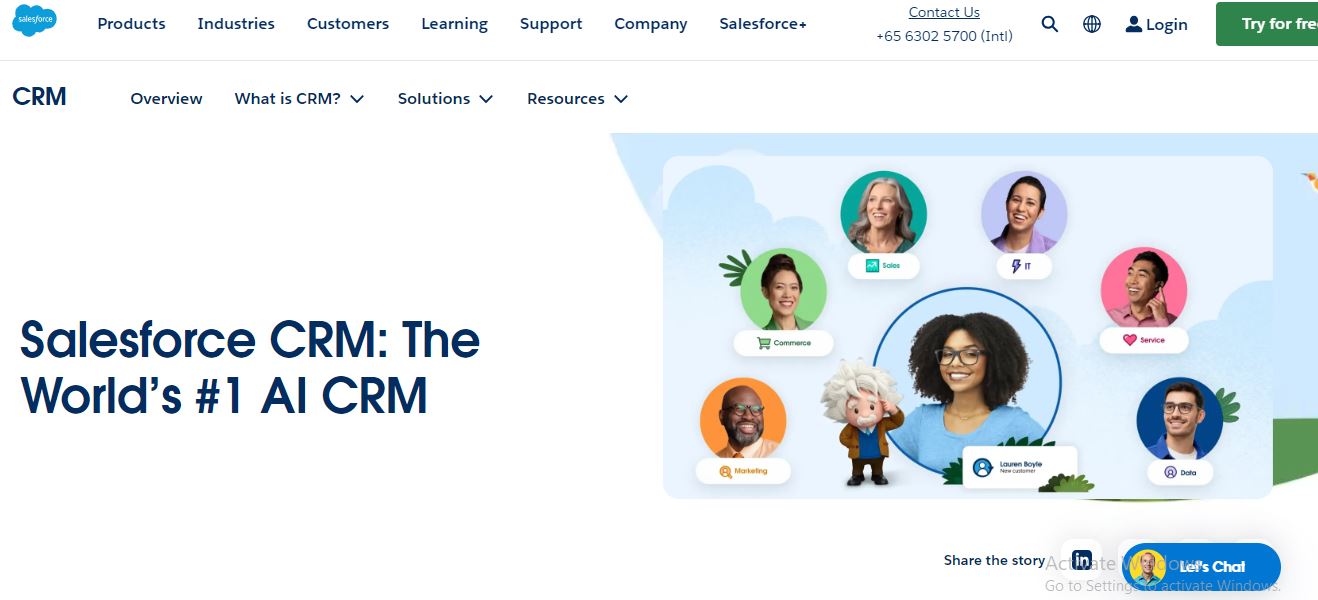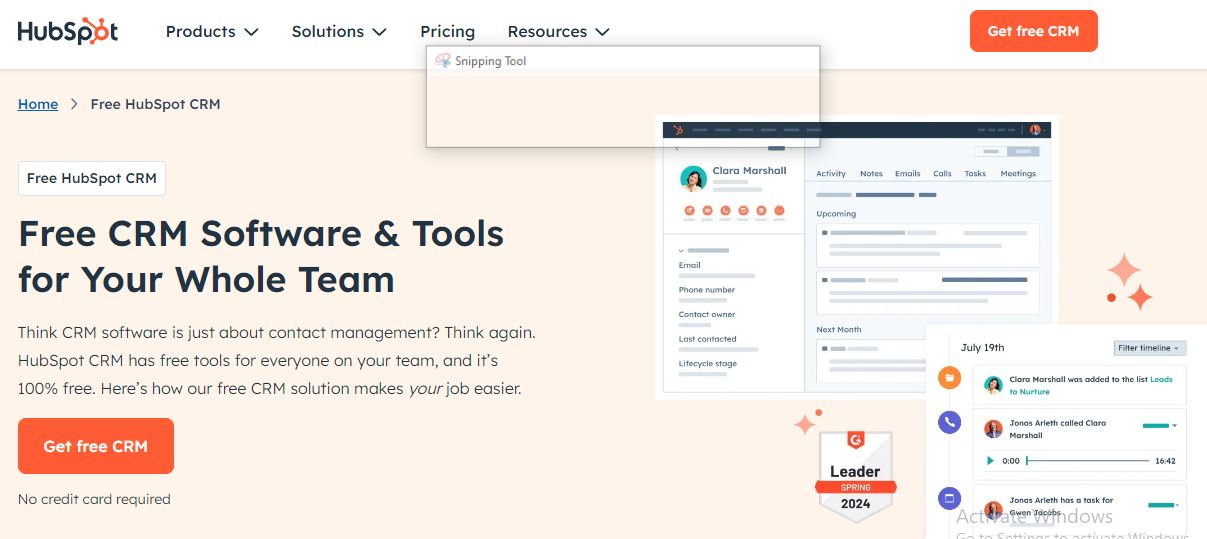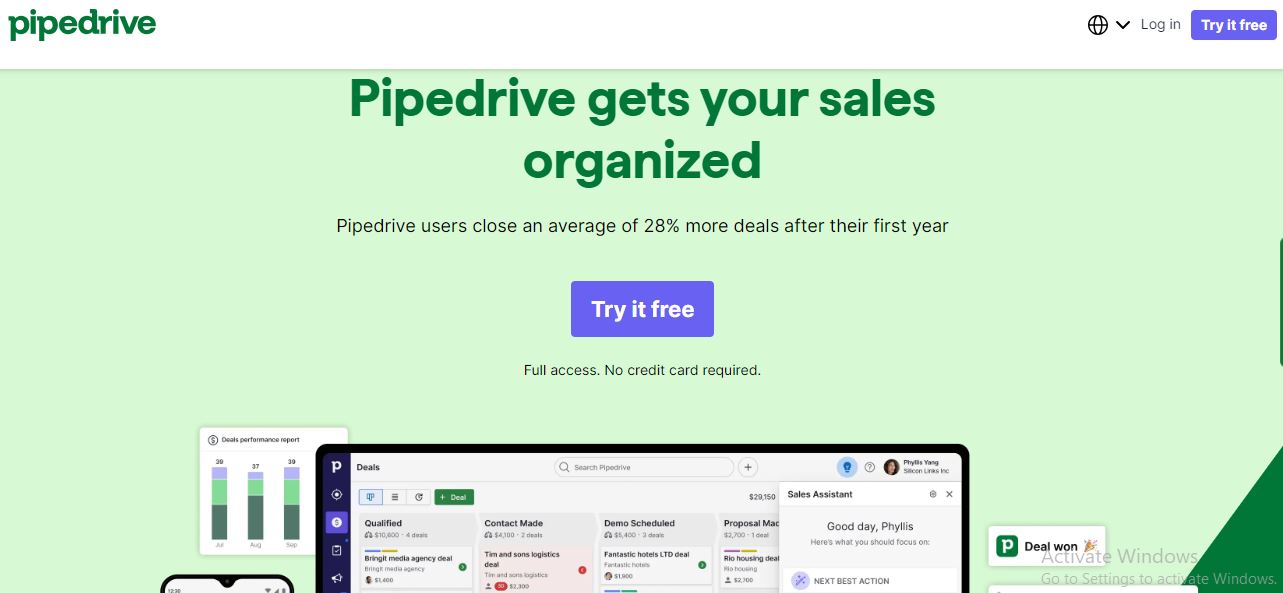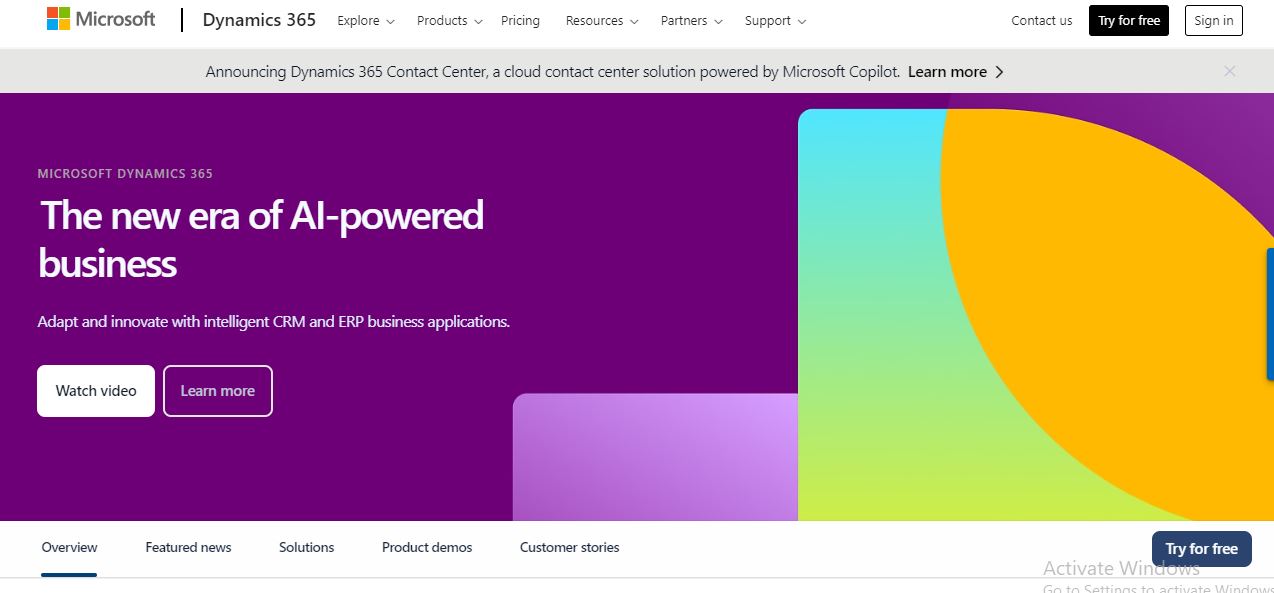Customer Relationship Management (CRM) tools are no longer optional. They’re critical. In 2024, businesses that invest in the right CRM see a 41% revenue increase within a year.
Whether you’re a startup or a global enterprise, managing customer interactions effectively is key to growth. With countless options available, choosing the best CRM can feel overwhelming.
The right choice can transform your sales, marketing, and service processes, creating stronger customer relationships and driving success. Ready to find the perfect CRM for your business? Let’s explore the best tools available today.
Comprehensive Review of Monday.com CRM

Reasons to Buy Monday.com CRM
- Highly Customizable: Tailor workflows, pipelines, and dashboards to meet your specific business needs, with no coding required.
- Intuitive Interface: User-friendly design with drag-and-drop functionality, ideal for both beginners and advanced users.
- Excellent Automation Features: Automate repetitive tasks with pre-built templates or custom workflows to save time and reduce manual effort.
- Strong Integrations: Seamlessly integrates with popular tools like Slack, Google Drive, Mailchimp, and over 100 other apps.
- Scalable: Suitable for businesses of all sizes, from startups to large enterprises, with plans that grow alongside your business.
- Mobile Access: Fully functional iOS and Android apps allow you to manage your CRM on the go.
- Comprehensive Task Management: Integrates with Monday’s project management tools, making it a powerful all-in-one solution for managing both tasks and customer relationships.
What Sets Monday.com CRM Apart
- Project Management Integration: Unlike many CRMs, Monday.com excels in combining CRM functionalities with project management, providing a unified platform for managing tasks, sales, and customer data.
- User Experience: The platform’s visually appealing and straightforward interface makes it easy for teams to adopt and use effectively, minimizing the learning curve.
- No-Code Automation: The no-code workflow automation builder is particularly user-friendly, allowing businesses to automate processes without technical expertise.
- AI-Driven Features: Monday.com’s AI tools enhance productivity by assisting with task automation and providing insights into customer interactions and sales forecasting.
What It Lacks
- Complex Pricing Structure: Monday.com’s pricing plans can be confusing and might feel restrictive, especially for smaller teams or businesses on a tight budget.
- Limited CRM Focus: While it offers comprehensive CRM capabilities, the platform’s roots in project management mean it might lack some of the advanced CRM-specific features found in dedicated CRM systems like Salesforce or Zoho CRM.
- Integration Limitations: Although Monday.com integrates with many tools, it doesn’t match the extensive integration ecosystem of more established CRM platforms, which might limit its functionality for businesses with complex needs.
- Support Availability: Customer support options are somewhat limited, with difficulties in accessing live chat or phone support, which could be a drawback for businesses requiring immediate assistance.
Comprehensive Review of HubSpot CRM

Reasons to Choose HubSpot CRM
- Robust Free Plan: HubSpot’s free tier is among the most generous in the industry, offering essential CRM functionalities like contact management, deal tracking, and email marketing without any cost. It’s an excellent starting point for small businesses or startups.
- Seamless Integration: HubSpot integrates with over 875 third-party apps, allowing businesses to connect their existing tools and workflows effortlessly. This makes it a flexible solution for companies with varied tech stacks.
- Powerful Marketing and Sales Tools: From email marketing automation to pipeline management, HubSpot provides comprehensive tools that support both marketing campaigns and sales processes. It enables personalized communication with prospects and clients, enhancing engagement and conversion rates.
- Scalable Pricing Plans: Whether you’re a small business or an enterprise, HubSpot offers scalable plans that grow with your business. Features like advanced analytics, lead scoring, and automation become available as you move up in tiers.
- User-Friendly Interface: HubSpot is known for its intuitive and visually appealing interface, which helps reduce the learning curve, making it accessible even to non-technical users.
What Distinguishes HubSpot CRM
- Unified Ecosystem: HubSpot’s CRM isn’t just a standalone tool; it’s part of a broader ecosystem that includes marketing, sales, service, CMS, and operations hubs. This integration ensures that all your customer data and interactions are consolidated in one place, providing a seamless user experience.
- Advanced Reporting and Analytics: HubSpot offers customizable dashboards and in-depth analytics, helping businesses make data-driven decisions. The CRM’s ability to track and report on campaign performance, sales activities, and customer interactions in real-time is a significant advantage.
- HubSpot Academy: For businesses looking to upskill their teams, HubSpot Academy offers a wealth of free educational resources, including courses, certifications, and tutorials on how to maximize the CRM’s potential.
Areas Where HubSpot CRM Falls Short
- Costly Upgrades: While the free plan is robust, advanced features like automation, custom reporting, and premium support are locked behind higher-tier plans, which can become expensive, particularly for small businesses or startups with limited budgets.
- Customization Limitations: HubSpot’s customization options, particularly in dashboards and pipelines, can be somewhat limited compared to more specialized CRMs. This could be a drawback for businesses with complex sales processes or unique CRM requirements.
- Steeper Learning Curve for Advanced Features: While the basic features are user-friendly, mastering HubSpot’s more advanced tools, such as marketing automation and custom integrations, may require a significant investment in time and training.
In-Depth Review of Pipedrive CRM

Why You Should Consider Pipedrive CRM
- Sales-Centric Design: Pipedrive is built specifically with sales teams in mind, offering customizable pipelines that allow for a visual, easy-to-manage sales process.
- User-Friendly Interface: The interface is clean and straightforward, making it accessible even to those with minimal CRM experience.
- Comprehensive Automation: Automate repetitive tasks such as follow-ups, email campaigns, and data entry with ease, freeing up time for your sales team to focus on closing deals.
- Integration Options: Pipedrive offers over 300 integrations, including popular tools like Zoom, Slack, and Google Drive, allowing you to create a seamless workflow that fits your business needs.
- AI-Powered Sales Assistant: Pipedrive’s AI Sales Assistant provides insights and suggestions to help you optimize your sales processes, from managing deals to improving customer interactions.
- Flexible Customization: Whether it’s tailoring sales pipelines or creating custom fields, Pipedrive allows you to adapt the CRM to match your specific business requirements.
What Makes Pipedrive Stand Out
- Visual Pipeline Management: Pipedrive’s visual sales pipeline is one of its standout features, allowing users to track deals visually as they progress through different stages. This makes it easy to see the status of each deal at a glance.
- LeadBooster Add-On: Pipedrive’s LeadBooster feature is a comprehensive lead generation tool that includes chatbots, live chat, and web forms, making it easier to capture and qualify leads directly from your website.
- Integrated Communication Tools: Pipedrive integrates communication channels, such as email and phone, directly into the CRM, allowing you to manage all your customer interactions in one place.
- Customizable Reports and Dashboards: Generate detailed reports and dashboards that provide insights into sales performance, helping you make data-driven decisions.
Areas Where Pipedrive Falls Short
- Customer Support Limitations: While Pipedrive offers various support options, users have reported challenges with customer service, particularly in accessing timely assistance for technical issues.
- Limited Marketing Automation: Compared to some competitors, Pipedrive’s marketing automation capabilities are less extensive, which might be a drawback for businesses looking for an all-in-one sales and marketing solution.
- Cost Considerations: While Pipedrive is competitively priced, some features like advanced reporting, AI tools, and the LeadBooster add-on come with additional costs, which can add up, especially for smaller teams or startups.
- Integration Depth: Although Pipedrive supports a wide range of integrations, the depth and functionality of these integrations can vary, which might limit the CRM’s effectiveness for businesses with more complex needs.
Comprehensive Review of Zoho CRM

Reasons to Consider Zoho CRM
- Cost-Effective Plans: Zoho CRM offers a range of pricing plans, including a free version for up to three users, making it accessible for startups and small businesses. The paid plans start at $14 per user per month, providing substantial value for the features offered.
- Robust Feature Set: Includes sales automation, lead management, contact management, and advanced analytics. The platform supports over 500 daily mass emails, which is significant for marketing teams.
- Highly Customizable: With the Canvas feature, you can design your CRM interface to fit your brand’s needs without any coding. This allows for extensive personalization, ensuring the CRM works precisely as you need it to.
- AI-Powered Assistant – Zia: Zia, the AI assistant, helps with tasks like sales predictions, workflow automation, and data enrichment, making it easier to manage complex sales processes.
- Comprehensive Integrations: Supports a wide range of third-party applications, including Google Workspace, Microsoft Office 365, Slack, Mailchimp, and more. These integrations allow businesses to create a seamless workflow across different tools.
- Security and Compliance: Offers 24/7 data security and compliance with international data protection regulations, making it a reliable choice for handling sensitive customer information.
What Sets Zoho CRM Apart
- All-In-One Ecosystem: Zoho CRM is part of the larger Zoho suite, which includes over 40 integrated apps for everything from email marketing to accounting. This ecosystem allows businesses to manage all aspects of their operations within a single platform.
- Advanced Sales Automation: The Blueprint feature is a standout, allowing businesses to create a visual representation of their sales processes and automate repetitive tasks. This helps in maintaining consistency across the sales lifecycle.
- Flexible Reporting and Analytics: Zoho CRM provides customizable dashboards and reports, enabling businesses to monitor key metrics and make data-driven decisions. The platform also supports territory management and multiple currencies, which is crucial for global businesses.
- Intuitive User Interface: Despite its rich feature set, Zoho CRM maintains a user-friendly interface that is easy to navigate. This reduces the learning curve and helps teams to quickly get up to speed.
What Zoho CRM Lacks
- Limited Features in Lower Tiers: The free and lower-tier plans have limited features, such as basic automation and restricted analytics. For businesses needing more advanced functionality like lead scoring, email parsing, or extensive automation, higher-tier plans are necessary.
- Customer Support Constraints: While Zoho CRM offers numerous resources like video guides and documentation, the basic support plan includes only 8/5 customer support, which may not be sufficient for businesses that require immediate assistance.
- Complexity in Setup: Setting up Zoho CRM can be a bit complex, especially for users new to CRM systems. Although the platform offers customization, the depth of features may be overwhelming for smaller businesses or those without dedicated IT support.
Comprehensive Review of Close CRM

Why Choose Close CRM?
- Integrated Multichannel Communication: Close CRM unifies email, phone calls, SMS, and video communication into one platform, allowing sales teams to manage all interactions seamlessly.
- Powerful Sales Automation: The platform excels in automating repetitive tasks like data entry, follow-up reminders, and call logging, helping sales teams focus on closing deals.
- User-Friendly Interface: With its intuitive design, Close CRM is easy to navigate, making onboarding quick and painless, even for users new to CRM systems.
- Built-in VoIP Dialer: The VoIP tools, including a power dialer and call recording, are industry-leading, significantly boosting productivity for teams that rely on phone communication.
- Real-Time Lead Management: Close CRM ensures prompt follow-up on leads and opportunities, preventing potential deals from slipping through the cracks.
- Mobile Functionality: The mobile app offers nearly full CRM functionality, enabling sales reps to stay productive while on the go.
- Customizable Reports: Users can create custom reports to track sales performance and identify areas for improvement.
What Makes Close CRM Stand Out?
- Focus on Sales Optimization: Unlike broader CRMs that cater to various business functions, Close CRM zeroes in on sales, providing tailored tools like predictive dialing and Smart Views to prioritize leads.
- Seamless Multichannel Inbox: The unified inbox brings together all communication channels, making it easier for sales teams to track and manage customer interactions.
- Scalable Customization: Close CRM allows for significant customization, from creating custom fields and pipelines to integrating with third-party apps via Zapier, ensuring the CRM grows with your business.
- Team Collaboration Features: The platform supports collaboration with task delegation, shared inboxes, and real-time notifications, fostering a more cooperative sales environment.
Where Close CRM Falls Short
- No Free Plan: Close CRM does not offer a free version, which might deter startups or small businesses with limited budgets. The 14-day trial may not be sufficient for a full evaluation.
- Limited Advanced Analytics: While the platform offers basic reporting and analytics, it lacks the depth of advanced analytics found in more comprehensive CRMs, potentially requiring additional tools for in-depth data analysis.
- Integration Limitations: Although Close CRM provides essential integrations, its ecosystem is not as extensive as competitors like HubSpot, which might be limiting for businesses needing a broader range of functionalities.
- Cost Considerations: While Close CRM’s pricing is competitive for the features offered, the cost can add up, particularly when additional functionalities or customizations are required.
- Learning Curve for Advanced Features: Some advanced features, like custom reports or deeper integrations, might require a steeper learning curve or additional training.
Expert Review of Freshsales CRM

Reasons to Choose Freshsales CRM
- AI-Powered Insights: Freddy AI, Freshsales’ integrated AI engine, offers predictive lead scoring, deal insights, and suggestions for engagement strategies, helping sales teams make data-driven decisions.
- Comprehensive Communication Tools: The CRM integrates multiple communication channels, including email, phone, SMS, live chat, and even social media, allowing seamless interactions with customers from one platform.
- Highly Customizable: Freshsales offers extensive customization options, from custom fields in contact management to tailored sales pipelines, ensuring the CRM adapts to your business needs.
- Integrated Sales and Marketing Tools: Beyond CRM functionalities, Freshsales includes marketing automation features such as email marketing templates, landing pages, and smart sequences, making it a versatile tool for both sales and marketing teams.
- User-Friendly Interface: Known for its ease of use, Freshsales provides an intuitive interface that minimizes the learning curve, enabling teams to get up and running quickly.
- Mobile App Accessibility: With mobile apps available for both iOS and Android, Freshsales ensures that sales teams can manage contacts, deals, and tasks on the go, complete with features like call logging and voice notes.
What Distinguishes Freshsales from the Competition
- Freddy AI: The AI-driven features of Freshsales set it apart from many other CRMs. Freddy AI not only scores leads based on machine learning models but also continually refines its predictions by learning from user feedback. This adds a layer of intelligence that significantly enhances the sales process.
- Seamless Integration with Freshdesk: For businesses already using Freshdesk for customer support, the integration with Freshsales is a game-changer. It allows support tickets and customer interactions to sync seamlessly with CRM records, providing a 360-degree view of the customer journey.
- Flexible Pricing Tiers: Freshsales offers a range of pricing options, including a free plan for small businesses and more advanced tiers for growing enterprises. This flexibility allows companies to start small and scale their CRM usage as their needs expand.
Areas Where Freshsales Could Improve
- Feature Siloing: Some advanced features are locked behind higher-tier plans, which might be a limitation for small businesses that need these functionalities but are on a budget.
- Limited Marketing Capabilities: While Freshsales includes some marketing automation tools, they are relatively basic compared to dedicated marketing platforms. For more advanced marketing needs, businesses might need to integrate Freshsales with other tools like Freshmarketer.
- Complexity in Scaling: As businesses grow, the need for more integrations and advanced features could lead to increased costs and complexity, particularly if multiple Freshworks products are required.
Comprehensive Review of Dynamics 365 CRM

Reasons to Consider Dynamics 365 CRM
- Deep Integration with Microsoft Ecosystem: Seamlessly integrates with Microsoft Office, Teams, LinkedIn Sales Navigator, and more, ensuring smooth workflows and enhanced productivity.
- Advanced AI Capabilities: Offers AI-driven insights, predictive analytics, and automated recommendations that help businesses optimize customer interactions and sales strategies.
- Highly Customizable: Tailor workflows, dashboards, and reports to specific business needs, with industry-specific modules for sectors like healthcare, manufacturing, and retail.
- Comprehensive Customer Service Features: Provides robust tools for managing customer service, including AI-driven virtual agents, intelligent case routing, and real-time sentiment analysis.
- Scalable and Flexible: Suitable for medium to large enterprises with the ability to add modules as needed, making it adaptable to growing business requirements.
- Multi-Channel Marketing and Sales: Supports omnichannel communication, allowing businesses to reach customers through their preferred channels and create personalized customer journeys.
What Sets Dynamics 365 CRM Apart
- Integration with Microsoft Tools: The ability to integrate deeply with Microsoft Office 365, Azure, and other Microsoft services is a significant advantage, enabling businesses to leverage familiar tools within their CRM processes.
- AI-Enhanced Functionality: Dynamics 365’s AI capabilities are not just add-ons but integral to the platform, offering sophisticated tools like customer sentiment analysis, churn prediction, and relationship health scoring.
- Industry-Specific Solutions: Dynamics 365 provides pre-configured solutions tailored to specific industries, helping businesses accelerate deployment and ensure compliance with industry regulations.
- Robust Field Service Management: Offers detailed tools for managing field service operations, from scheduling and dispatching to real-time coordination and asset management, making it ideal for businesses with mobile workforces.
Areas Where Dynamics 365 CRM Could Improve
- Complex Pricing Structure: The pricing can be confusing and may quickly escalate with the need for additional modules or customizations, making it less budget-friendly for smaller businesses.
- Steep Learning Curve: The extensive features and customization options can make Dynamics 365 challenging to learn and navigate, requiring significant training for new users.
- Performance Issues: Some users report that the platform can be slow at times, particularly when syncing data or performing complex tasks, which could impact productivity.
- Limited Cost-Effective Options for SMBs: While powerful, the entry-level pricing starts higher than some competitors, making it a less viable option for small businesses with limited budgets.
Master Guide to Folk CRM: An In-Depth Review

Why Choose Folk CRM?
- Highly Customizable Dashboards: Folk CRM allows for extensive customization, enabling users to create dashboards that fit their specific needs, whether it’s for sales, marketing, or other business functions.
- Efficient Contact Management: With features like automatic de-duplication and contact enrichment, Folk CRM simplifies managing and organizing contact data, making it easy to keep information accurate and up-to-date.
- Integration with Popular Tools: Folk seamlessly integrates with Gmail, Outlook, LinkedIn, and other platforms, streamlining the process of importing contacts and managing communication.
- Workflow Automation: The platform offers automation tools for email campaigns and other repetitive tasks, helping businesses save time and reduce manual effort.
- User-Friendly Interface: Folk CRM is designed to be intuitive, with an interface that minimizes the learning curve, allowing teams to get started quickly.
What Sets Folk CRM Apart?
Folk CRM stands out for its ability to handle multiple business functions within a single platform. Whether you’re managing sales, recruitment, fundraising, or partnerships, Folk provides the flexibility needed to adapt to various workflows. Additionally, the CRM’s Chrome extension, FolkX, is a powerful tool for lead prospecting, allowing users to easily pull contact information from websites like LinkedIn and integrate it directly into the CRM.
The platform’s “Magic Fields” feature is another highlight. This AI-powered tool automatically generates and populates custom fields, enhancing the quality of your contact data and allowing for more personalized outreach. This feature, combined with its strong automation capabilities, makes Folk a competitive choice for businesses that require a CRM with both breadth and depth.
Areas Where Folk CRM Falls Short
- Limited Reporting and Analytics: Unlike more advanced CRMs, Folk CRM lacks robust reporting features. Users cannot easily create visual reports or analyze trends within their data, which might be a drawback for businesses that rely heavily on data-driven decision-making.
- Manual Process Requirements: Folk’s outreach and interaction tracking is mostly manual, which could be a limitation for teams that frequently engage in live meetings or phone calls. The CRM does not automatically log these interactions, potentially leading to gaps in the customer journey.
- Scalability Challenges for Large Teams: While Folk is excellent for small to medium-sized businesses, it may not be the best fit for larger organizations with complex sales processes. The platform’s simplicity, which is an asset for smaller teams, could become a limitation as business needs grow.
Comprehensive Review of Nimble CRM

Reasons to Consider Nimble CRM
- Unified Communication History: Nimble centralizes all customer interactions across social media, email, and other channels, giving you a comprehensive view of every relationship.
- Seamless Integrations: Nimble integrates effortlessly with Google Workspace, Microsoft 365, and a host of other business apps, ensuring that it fits neatly into your existing workflow.
- Affordability: Priced at $19 per user per month, Nimble offers full functionality at a fraction of the cost of some competitors, making it a budget-friendly option for small businesses.
- Social Media Integration: Nimble excels in pulling data from social media profiles, helping businesses enrich customer profiles and track social engagement.
- Customizable Dashboards: The Today Page is fully customizable, allowing you to prioritize the information that matters most to your team.
What Makes Nimble CRM Stand Out
- Social CRM Capabilities: Unlike many CRMs that focus primarily on email or phone communication, Nimble excels at integrating social media data into your customer profiles. This is particularly valuable for businesses that engage heavily on platforms like LinkedIn and Twitter.
- Prospector Tool: Nimble’s Prospector feature is a game-changer for sales teams, allowing them to quickly find and enrich contact information from across the web. This tool is crucial for lead generation and nurturing.
- Simple Pricing Structure: With a straightforward pricing model, Nimble avoids the confusion often associated with tiered pricing plans. It offers a single plan that covers most of the features you’ll need, making it easier to budget for.
Areas Where Nimble Falls Short
- Limited Advanced Features: While Nimble is great for basic CRM tasks, it may lack some of the more advanced features found in larger platforms like Salesforce, such as extensive automation options or advanced analytics.
- Mobile App Limitations: Although Nimble has a mobile app, some users find that it lacks the full functionality of the desktop version, which can be a drawback for teams that need robust mobile access.
- No Free Plan: Unlike some of its competitors, Nimble does not offer a free tier. However, it does provide a 14-day free trial, which should be sufficient to determine if it’s the right fit for your business.
Comprehensive Review of Creatio CRM

Why Choose Creatio CRM?
- No-Code Automation: Creatio’s standout feature is its no-code platform, which allows users to automate complex workflows without needing technical expertise. This flexibility is ideal for businesses looking to streamline operations efficiently.
- Comprehensive Suite: The platform covers all major aspects of CRM with distinct modules for sales, marketing, and service, ensuring that all customer interactions are effectively managed and tracked.
- Highly Customizable: With extensive customization options, businesses can tailor the CRM to their specific needs, including creating custom dashboards, workflows, and automations.
- Strong Integration Capabilities: Creatio integrates seamlessly with numerous tools and platforms, allowing businesses to extend its functionality and maintain a cohesive tech ecosystem.
- Scalability: Whether you are a small startup or a large enterprise, Creatio can scale with your business, offering solutions that grow as your needs evolve.
What Makes Creatio CRM Unique?
- Unified Business Process Management: Creatio goes beyond typical CRM capabilities by integrating business process management (BPM) into its platform, enabling users to design and automate their entire business processes, not just customer interactions.
- AI-Driven Insights: The platform leverages artificial intelligence to provide actionable insights and predictive analytics, helping businesses make data-driven decisions and improve customer engagement.
- Component-Based Architecture: Creatio is modular, meaning businesses can choose and pay for only the functionalities they need, whether it’s focused on sales, marketing, or service, or a combination of all three.
- Advanced Reporting: Creatio offers detailed reporting tools that allow businesses to track performance metrics, forecast trends, and gain deep insights into customer behavior and sales activities.
Areas Where Creatio CRM Falls Short
- High Costs: While Creatio offers a powerful suite of tools, its pricing can be steep, particularly when combining multiple modules (Sales, Marketing, Service). This may be a deterrent for smaller businesses or startups on a tight budget.
- Complex Initial Setup: The initial setup and customization of Creatio CRM can be time-consuming and may require a steep learning curve. Businesses without in-house technical expertise might face challenges during the implementation phase.
- Limited Social Media Integration: Unlike some of its competitors, Creatio does not excel in social media management. The platform lacks robust tools for monitoring social media activity or integrating with platforms like LinkedIn, which can be a drawback for businesses that rely heavily on social media for lead generation.
- Interface Navigation: Some users report that navigating Creatio’s interface can be complex, especially when accessing its more advanced features, which might affect the user experience

